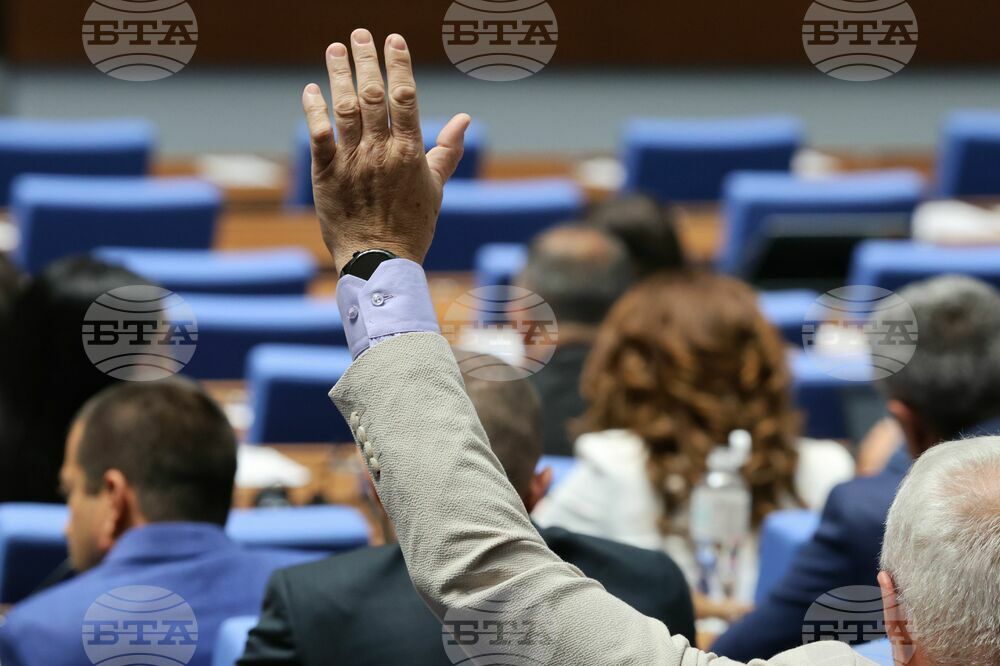site.btaParliament Debates No-Confidence Motion against Zhelyazkov Cabinet, Vote Scheduled for Friday


Parliament debated Thursday a motion of no confidence in Prime Minister Rosen Zhelyazkov over its fiscal policy. It was submitted by the Vazrazhdane parliamentary group on June 27, and backed by the MPs of Velichie and MECh.
The plenary hall refused to allow live broadcasting of the debate on the Bulgarian National Television and Bulgarian National Radio.
Prime Minister Rosen Zhelyazkov and ministers from the cabinet are present in the plenary hall.
That will be the third no-confidence motion since the Zhelyazkov Cabinet took office.
The motion over what is described as the government’s failure in fiscal policy, will be put to the vote at 1:10 p.m. on Friday, exactly 24 hours after the end of the Thursday debate.
Vazrazhdane's reasoning for the motion reads that the Cabinet, supported by the current ruling coalition, is deepening fiscal imbalances and is not taking the necessary urgent measures to restore the sustainability of Bulgaria’s public finances. According to the opposition parliamentary group, the Government is pursuing "incorrectly set goals, based on false statistical data, overly optimistic macroeconomic forecasts, and unrealistic expectations regarding tax revenue collection."
The first and second no-confidence votes against the Zhelyazkov Cabinet were unsuccessful. The first was initiated by Vazrazhdane for "failure in the foreign policy sector". The second motion, submitted by MECh, was for "failure in the fight against corruption".
Following is a takeaway from the debate, starting with
What the motion backers said:
The reasoning for the motion was presented by Vazrazhdane leader Kostadin Kostadinov. He spoke of "successive profound failures in the pursued financial policy" and said that the Cabinet is deepening fiscal imbalances and is not undertaking the necessary urgent measures to restore the sustainability of the public finances.
He argued that the government’s budget pursues incorrectly set goals, based on false statistical data, overly optimistic macroeconomic forecasts, and unrealistic expectations for tax revenue collection.
The parliamentary group of MECh said it will fully support this no-confidence motion because, “whatever topic we choose for a vote against this government, it will be relevant”, to use the words of MECh leader Radostin Vasilev. “There is no argument, no eurozone [-related reasons, ed.], no excuse that could dissuade MECh that the GERB-Peevski government, supported by There Is Such a People and BSP, must go. Unfortunately, it is supported by Continue the Change – Democratic Bulgaria,” he said.
An address by Ivelin Mihaylov, leader of Velichie, on behalf of his entire group, drew a stark contrast between an idyllic western society which he saw during a protest in Brussels co-organized by Velichie last week, and a gloomy picture in Bulgaria. The idea was that Bulgaria was not ready to join the eurozone, contrary to what the Bulgarian and EU authorities say. He spoke of mobsters terrorizing farmers with the authorities turning a blind eye to the problem; of collapse in health care and education; of older people not living long enough to see a pension raise because of horrendous conditions in care homes; of an environmental crisis.
What the motion opposers said:
Finance Minister Temenuzhka Petkova argued that this no-confidence vote is not related to the implementation of the budget as of May 31 and the reality is that it was prompted by “Bulgaria's successful accession to the eurozone”. "Bulgaria covered absolutely and honestly all the criteria related to our eurozone membership, and very soon, in just a few days, we will finalize the process of adopting the euro in Bulgaria from January 1, 2026. Bulgaria will take its worthy place in the heart of Europe, the government must be supported for that,” said the Minister.
Toma Bikov from GERB-UDF said that three no-confidence motions in six months is a diagnosis not for the government but for the opposition. “Today's debate is no different from the debates held in this chamber on a wide variety of issues. It is not significant because when you constantly introduce votes of no confidence, they become part of everyday life,” Bikov added. He argued that the current government is managing to “calm the situation, stabilize the institutions and get things back on track”, and said that six months is not enough time “to repair the damage done to Bulgaria's institutions over the last four years”.
BSP-United Left Floor Leader Dragomir Stoynev said that the no-confidence vote is harmful, but the debate itself is useful. “BSP-United Left will vote against this vote of no confidence because we believe that Bulgaria's stability, social justice and European direction should not be threatened because of fear, as not fear but reason should lead Bulgarian politics, Stoynev said in conclusion.
In response, MECh leader Radostin Vasilev accused BSP-United Left of “astonishing hypocrisy” and of betraying Bulgarian pensioners and Bulgarian mothers. “Who among your voters wants the introduction of the euro?” Vasilev asked.
The parliamentary group of the Alliance for Rights and Freedoms announced that it will not participate in the vote of no confidence, citing serious differences with the motion’s sponsors, especially regarding the eurozone membership issue. ARF’s Hasan Ademov emphasized that while a no-confidence vote is a constitutional tool for dialogue, now may not be the right time to topple the government - especially on the eve of the final decision on Bulgaria's accession to the eurozone. He questioned whether there is a clear political alternative and expressed concern about risks to fiscal stability both short- and long-term.
/NF/
Additional
news.modal.image.header
news.modal.image.text
news.modal.download.header
news.modal.download.text
news.modal.header
news.modal.text






















































